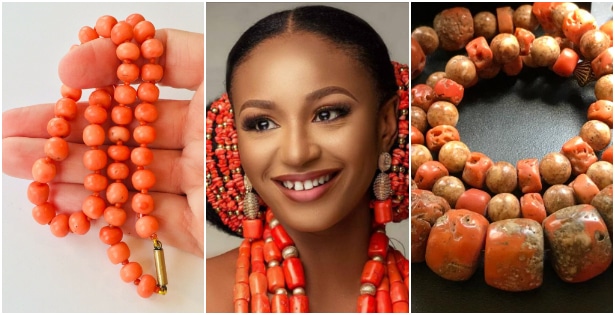- In particular, the Yoruba people, one of Nigeria’s largest ethnic groupings, have a long and fascinating history with coral beads.
- The Yoruba people have a deep appreciation for a wide range of artistic mediums, handiwork, and symbolism.
- They have a vibrant and colorful culture. Among the numerous cultural artefacts they treasure, coral beads stand out as symbols of status, tradition, and spirituality.
Nigeria, located in West Africa, is a country filled with diverse cultures, languages, and traditions, one of its remarkable treasures is the beautiful coral beads.
Coral beads have a long and interesting history in Nigeria, especially among the Yoruba people, who are one of Nigeria’s largest ethnic groups.
The Yoruba people have a strong affinity for many different types of art, craftsmanship, and symbolism. Their culture is dynamic and rich. Coral beads stand out as emblems of rank, tradition, and spirituality among the myriad cultural artefacts they cherish, according to Guardian.
READ ALSO: Afrojuicy cultural artworks: Renowned artist aims to change the narrative using her unique artworks

The Yoruba tribe is dedicated to maintaining its distinctive tradition, as evidenced by the exquisitely carved beads that have been passed down from generation to generation. They come in a variety of hues and forms, but the red coral beads are the most prized.
Symbols of Royalty and Honor
Coral beads are inextricably associated with aristocracy and status in Yoruba culture. As a show of their high position and authority, they were once only given to kings, queens, chiefs, and other influential people. The Yoruba kings stood out from the other tribes by donning coral beads, which were akin to a mark of riches and authority.
Coral Beads: Treasures of Yoruba Culture
Coral beads are prized as priceless representations of heritage and spirituality in Yoruba culture, and they are valued as more than just lovely ornaments. Through these vibrant and ornate beads, the Yoruba people express their love of beauty and exceptional talent for transforming the gifts of nature into gorgeous ornaments.
Coral Beads: Guardians of the Spirit
Coral beads have profound spiritual importance in Yoruba culture in addition to their aesthetic value. They are thought to have mystical abilities that serve as charms for protection against evil spirits and other negative energies. In the Yoruba culture, wearing coral beads is about more than just looking good—it’s also about protecting one’s spirit.
To communicate with their ancestors and please the gods, people use coral beads at ceremonial events and festivals. These beads are believed to protect the wearer from harm, help with childbirth, and offer good luck.
Celebrations Using Coral Beads in Yoruba
In Yoruba culture, coral beads play a significant role, particularly during major occasions like weddings and ceremonial gatherings. To commemorate these events, people wear them as lovely jewellery.
Coral beads are treasured by the Yoruba culture as a way to preserve their cultural identity. In turn, this enhances the exquisite mosaic of global cultures.
READ ALSO: Make una no fall our in-law o: Nigerians praise Oyinbo man as he dances with Igbo cultural troupe
Autism In Nigeria: Cultural Perceptions and Implications
In other story, Autism is one of the leading neurodevelopmental disorders in the world. We live in a diversified world with people of different economic backgrounds and also challenges. Many people process information differently and at different paces, and autism is among the least understood topics, especially in Nigeria.
However, due to several efforts by schools and individuals, more people are becoming aware of the disorder.
Autism is a neurodevelopmental disorder. Neurodevelopmental disorders are a group of disorders that affect the development of the nervous system. These disorders often affect an individual’s learning ability, self-control, motor function, language, non-verbal communication, and memory.





